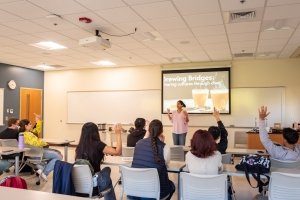Centre takes a multi-faceted approach to environmental responsibility
In 2021, Centre College established a dedicated sustainability office, a key component of the College’s Strategic Plan and its commitment to promote environmentally sustainable practices on campus and beyond.
Centre’s Brian Hutzley, vice president, CFO and treasurer, works closely with the Sustainability Committee — made up of faculty, staff and students — to address sweeping and innovative solutions to climate and sustainability issues.
“Centre is fortunate that President Moreland and our board of trustees are committed to the College reducing its carbon footprint, recognizing that doing so creates a healthier environment that also translates to cost savings.”
The following are a few of the new, as well as ongoing, initiatives.
One of the most significant sustainability undertakings by the College is a campus-wide lighting retrofit. A 2019 partnership between Centre and Tenzing Energy Solutions began a retrofit of most campus buildings with more efficient and safer lighting. Making the conversion to LED lighting is achieving significant emissions reductions and cost savings estimated to be more than $1 million over five years.
Additionally, Centre currently uses Circon, a state-of-the-art energy management system, in 90 percent of all campus facilities to allow technicians to read and control the temperature in any building and set schedules that reduce energy use.
Another approach the College is taking to its overall commitment to environmentally sound practices involves sustainable food. Locally raised foods, processed in ways that protect the environment and avoid wasting natural resources are an ongoing effort, and Centre is using creative methods to achieve its goals.
In August 2020, Centre entered a shared agricultural project with Danville’s Kentucky School for the Deaf. The “KSD & Centre College Sustainable Farms & Gardens,” located on the KSD campus, officially commenced farm activities in June 2021. The goal of this collaboration is agricultural and environmental education and Assistant Professor of Environmental Studies Jean Faye is leading this agricultural research project. The farm supports the educational mission of both institutions, growing vegetables for both dining commons, Cowan Hall (CC) and Grow Hall (KSD) and provides produce to local charity organizations. In the fall of 2021, the farm sent about 700 pounds of food to Centre’s dining hall and is expected to send more this year.
Keeping in mind that the last step in a sustainable food system is consumption, Centre partnered with Parkhurst Dining, a family-owned food service management company, in June 2022. Parkhurst mirrors Centre’s commitment to sustainability by offering a variety of healthier, innovative dining and catering options. Parkhurst has committed to sourcing up to 25 percent of all food from Kentucky, or within 100 miles, and will divert 100 percent of all food waste from landfills.
Another strategy in the College’s multi-pronged effort involves reducing greenhouse gas emissions.
“Centre is in the process of creating a broader, more holistic Sustainability Action Plan, and one of our top goals is to achieve carbon neutrality by 2040,” says Nick Bowman ’21, Centre’s first sustainability fellow. “To do this, we are tracking our greenhouse gas emissions and have found that transportation accounts for almost a quarter of all emissions.”
In an effort to reduce those transportation emissions, Centre applied for and was the sole recipient of the 2021 Club Car Campus Sustainability Grant, chosen from among large public institutions and private colleges across the U.S. Announced in January 2022, the grant was used for the purchase of a customized Club Car vehicle, a value up to $10,000. Club Car selected Centre College based on its commitment to sustainability and vision for how campus transportation contributes to reaching related goals.
Another way in which the College is reducing greenhouse gas emissions is its commitment to new construction and renovations that use as many LEED principles as possible. The Sustainability Committee (formerly the President’s Climate Commitment Advisory Committee) is committed to new construction aiming to achieve a minimum Silver LEED status.
Northside Residence Hall was awarded LEED Silver Certification status in May 2022. The National Green Building Council’s Leadership in Energy and Environmental Design provides a framework for healthy, efficient, carbon and cost-saving green buildings, and is a globally recognized symbol of sustainability achievement and leadership. This brings Centre’s total number of LEED-certified buildings to five, including Young Hall, Roush Campus Center, Pearl Hall and Brockman Commons.
The 135,000-square-foot Initiative for Wellness and Athletic Excellence (IWAE) is well underway and on track for LEED Gold Certification. The largest environmentally focused design methods specifically involve: geothermal wells, drilled on half of the under-construction football field on its north side as well as under the parking lot between Centre’s post office and the IWAE project, to supply energy for the new aquatics center; solar panels on the new fieldhouse and the Seabury Family Tennis Center; a landscaping plan that includes native plants and vegetation, as well as permeable surfaces to reduce stormwater runoff, combat heat islands and improve air quality; and the creation of both indoor and outdoor community spaces.
“Centre athletics is about the holistic education of young people,” says Brad Fields ’98, director of athletics and recreation. “We provide real-world opportunities for our student-athletes to practice and develop leadership. We are committed to making our facilities more sustainable, and the IWAE takes this promise to the next level.”
Centre students play a large part in creating an environmentally healthy campus via the Centre Environmental Association (CEA), a student-led organization committed to promoting, developing, and maintaining environmental sustainability in the Centre community through education, activism, and institutional change. Some of CEA’s recent efforts include sponsoring farm-to-table meals, organizing workshops, advocacy sessions and convo speakers, cleaning local creeks and streams, and sustaining the Centre garden.
The Centre community strives to secure a sustainable future and reduce the College’s carbon footprint.



